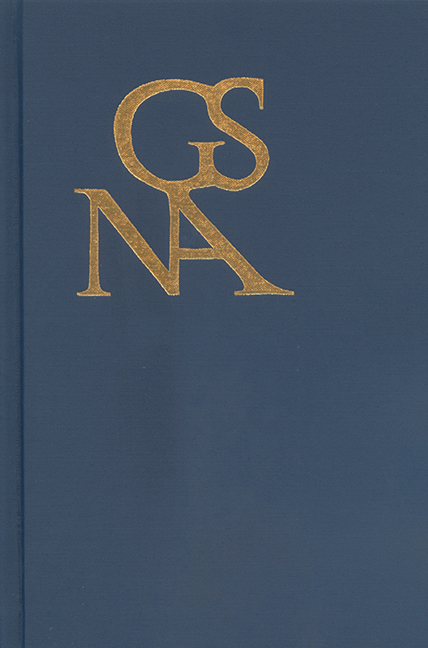Book contents
- Frontmatter
- Contents
- Special Section on Goethe and the Postclassical: Literature, Science, Art, and Philosophy, 1805–1815
- Helena, Then Hell: Faust as Review and Anticipation of Modern Times
- Histrionic Nationality: Implications of the Verse in Faust
- Die Wette in Goethes Faust
- Ecocriticism, the Elements, and the Ascent/Descent into Weather in Goethe's Faust
- Grablegung im Vorhof des Palasts: Groteske Anschaulichkeit in den vorletzten Szenen von Faust II
- Goethes Gnostiker: Fausts vergessener Nihilismus und sein Streben nach Erlösungswissen
- The Unconscious of Nature: Analyzing Disenchantment in Faust I
- Forms of Figuration in Goethe's Faust
- Goethe's Morphology of Knowledge, or the Overgrowth of Nomenclature
- Paraphrasis: Goethe, the Novella, and Forms of Translational Knowledge
- Dramas of Knowledge: The “Fortunate Event” of Recognition
- gegen: Bewegungen durch Goethes “Der Mann von funfzig Jahren”
- “Offenbares Geheimnis” oder “geheime Offenbarung”? Goethes Märchen und die Apokalypse
- Goethe's Green: The “Mixed” Boundary Colors in Zur Farbenlehre
- For Heaven's Sake, I Will Have You Walk into the Dark: Grillparzer's Containment of Beethoven and the Ambivalence of Their Melusina Project
- Imitation, Pleasure, and Aesthetic Education in the Poetics and Comedies of Johann Elias Schlegel
- Feindlich verbündet: Lessing und die Neuen Erweiterungen der Erkenntnis und des Vergnügens
- Juvenalian Satire and the Divided Self in Goethe's “Das Tagebuch”
- Book Reviews
Goethe's Morphology of Knowledge, or the Overgrowth of Nomenclature
from Special Section on Goethe and the Postclassical: Literature, Science, Art, and Philosophy, 1805–1815
Published online by Cambridge University Press: 14 March 2018
- Frontmatter
- Contents
- Special Section on Goethe and the Postclassical: Literature, Science, Art, and Philosophy, 1805–1815
- Helena, Then Hell: Faust as Review and Anticipation of Modern Times
- Histrionic Nationality: Implications of the Verse in Faust
- Die Wette in Goethes Faust
- Ecocriticism, the Elements, and the Ascent/Descent into Weather in Goethe's Faust
- Grablegung im Vorhof des Palasts: Groteske Anschaulichkeit in den vorletzten Szenen von Faust II
- Goethes Gnostiker: Fausts vergessener Nihilismus und sein Streben nach Erlösungswissen
- The Unconscious of Nature: Analyzing Disenchantment in Faust I
- Forms of Figuration in Goethe's Faust
- Goethe's Morphology of Knowledge, or the Overgrowth of Nomenclature
- Paraphrasis: Goethe, the Novella, and Forms of Translational Knowledge
- Dramas of Knowledge: The “Fortunate Event” of Recognition
- gegen: Bewegungen durch Goethes “Der Mann von funfzig Jahren”
- “Offenbares Geheimnis” oder “geheime Offenbarung”? Goethes Märchen und die Apokalypse
- Goethe's Green: The “Mixed” Boundary Colors in Zur Farbenlehre
- For Heaven's Sake, I Will Have You Walk into the Dark: Grillparzer's Containment of Beethoven and the Ambivalence of Their Melusina Project
- Imitation, Pleasure, and Aesthetic Education in the Poetics and Comedies of Johann Elias Schlegel
- Feindlich verbündet: Lessing und die Neuen Erweiterungen der Erkenntnis und des Vergnügens
- Juvenalian Satire and the Divided Self in Goethe's “Das Tagebuch”
- Book Reviews
Summary
DAS PUBLIKUM STUTZTE.” That was how Goethe described the reception of his Versuch die Metamorphose der Pflanzen zu erklären almost thirty years after its initial publication in 1790. How could a poet of such renown deviate “von seinem Wege” and devote so much time and energy to plants (Morphologie 752)? The reading public was astonished that Goethe had given more than passing attention to science, a completely alien field. But Goethe had not only ventured into the plant realm, he had wagered a sweeping theory about nature itself. Goethe the poet had pretences of becoming Goethe the scientist.
In the decades following the publication of his Essay, Goethe wrote an ever expanding apology for his work in natural science—“Der Verfasser teilt die Geschichte seiner Botanischen Studien mit”—in which he rebutted the fundamental assumption of what he considered to be a particularly modern ethos of knowledge:
[D]enn nach seinem [the public's] Wunsch sich gut und gleichförmig bedient zu sehen, verlangt es an jeden daß er in seinem Fache bleibe and dieses Ansinnen hat auch guten Grund: denn wer das Vortreffliche leisten will, welches nach allen Seiten hin unendlich ist, soll es nicht, wie Gott und die Natur wohl tun dürfen, auf mancherlei Wegen versuchen. Daher will man daß ein Talent das sich in einem gewissen Feld hervortrat, dessen Art und Weise allgemein anerkannt und beliebt ist, aus seinem Kreise sich nicht entfernte, oder wohl gar in einen weit abgelegenen hinüberspringe. Wagt es einer, so weiß man ihm keinen Dank, ja man gewährt ihm, wenn er auch recht macht, keinen besonderen Beifall.
(Morphologie 417)Goethe's suggestion that two seemingly disparate fields of inquiry, natural science and poetry, could be related lay completely “außer dem Gesichtskreise der Zeit” (Morphologie 458). As scientists became increasingly conscious of the disciplines in which they worked, science was pluralized, and the sciences began to operate in their own closed-off circles. Modes of inquiry and ways of knowing isolated themselves into increasingly specialized spheres of knowledge.
For Goethe, the increasing specialization of knowledge was a distinctive feature of a modern age that had come to overestimate itself based on “der großen Masse Stoffes, den sie umfasst.” By breaking knowledge down into discrete fields, or what Goethe refers to as disciplines [Fächer], the modern age was able to accumulate, process and manage more information.
- Type
- Chapter
- Information
- Goethe Yearbook 17 , pp. 153 - 178Publisher: Boydell & BrewerPrint publication year: 2010

